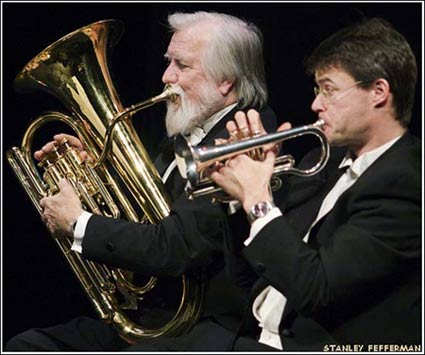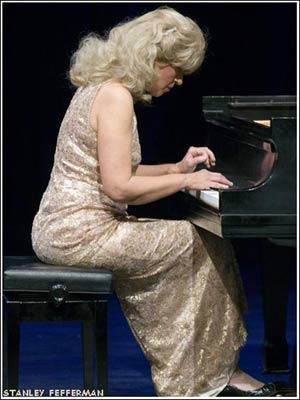 |
The 3rd Toronto International Chamber Music Festival
Presented by TrypTych |
|
| January 27–29, 2006 • Isabel Bader Theatre • Toronto |
|
|
|
|
|
|
Happy Birthday Wolfgang
by Stanley Fefferman |
| A Fanfare for Mozart (Friday, Jan, 27, 8 PM) |
| The opening fanfare at this festival in honour of Mozart’s 250th birthday was sounded by the gleaming Eastman Brass. Their stunning “Overture” to The Marriage of Figaro followed, introducing us to the potent Mozart elixir: light-hearted wit bubbling through profound emotion. Felicitas Keil then took the stage and broke hearts with Mozart’s Piano Sonata in E-flat K. 282, shaping it with her touch magical in its range from delicacy to force. Over all was the canopy of host Tom Allen’s upbeat, down-to-earth account of how Mozart struggled to live out the music that spontaneously played within him. |
|
 |
|
| The two hour program included several of Mozart’s juvenile compositions (“Imagine a kid in grade 3 composing this work”) performed by members of the Vienna Symphony Virtuosi (flute, trumpet, trombone and piano) including two regrettable and forgettable compositions by Mozart’s father Leopold. The evening concluded with the Eastman Brass performing the lively Divertimento by fellow genius Rossini because, as Tom Allen told us, “The Italians ‘got’ Mozart right from the start.” |
|
|
| A Day in Prague (Saturday Jan. 28, 2PM)
Prague had a ‘voracious appetite’ for Mozart’s music and never turned away from him as the ‘fickle Viennese’ had done. He visited Prague in 1787 to premier his 38th symphony, which he had completed on the journey. In honour of the warm Prague connection, the Toronto festival artistic directors conceived of a program that embedded Mozart’s Adagio and Fugue in C minor, K. 546 in a program of Dvorak and Janacek.
The Dvorak Sonatina in G Major Op. 100, pleasant though lightweight, show-cased articulate piano work by festival co-director William Shookoff who partnered with Erika Raum on violin. Later in the program, this duo featured Ms. Raum as a player and as a personality in the rhapsodic, discordant, complex piece written for her in 1995 by her mother Elizabeth Raum.
The highlight of the concert was Leos Janacek’s String Quartet No. 1 (1923). Subtitled Kreutzer Sonata, it is inspired by a Tolstoy story of the same name about a man who listens to his wife playing Beethoven’s Kreutzer Sonata with another man, and concludes they are having an affair. He murders them both. Janacek’s music gets inside the husband’s head as the worm of suspicion winds through it and possesses him. The Madawaska String Quartet, four young women from the Ottawa region who have been playing mostly in Canada since 2001, gave an assured and stirring performance of this dark, dramatic work.
They also did a convincing job on three selections from a song cycle entitled Cypress Trees that the anguished Dvorak wrote when he fell in love with one of his pupils only to find she chose to marry another man. (Dvorak soon overcame his despondency and in 1873 married her sister). We are also grateful to the Madawaska for performing the sole Mozart piece in this concert, the throbbingly lovely and melancholic Adagio and Fugue in C minor, K. 546.
The Madawaska String Quartet are: Rebecca van der Post and Sarah Fraser-Raff, violins; Anna Redekop, viola; and Amy Laing, cello.
|
|
|
|
Felicitas Keil in Concert (Saturday Jan. 28, 5 PM)
|
|
The inestimable Felicitas Keil bookended her solo concert with two Beethoven Sonatas: the E-Flat Major Op.27 No. 1—understood to be Beethoven’s farewell to classicism,—and the C Sharp Minor Op. 27 No. 2, —the famous “Moonlight” Sonata, his introduction to romanticism which changed European music forever.
While one continues to note the relative scarcity of Mozart in this festival, it is not possible to complain of Beethoven offerings by Ms. Keil who is one of the world’s foremost interpreters of his piano compositions. In her hands, the music becomes visible as forms, palpable as feelings, logical as thoughts, and enjoyable as the vista of an unfolding landscape seen from the basket of a balloon.
Between the Beethoven sonatas, Felicitas Keil played short pieces by composers considered now to be of the New Vienna School: Arnold Schonberg (1874-1951), Schonberg’s pupil Josef Hauer (1883-1959), and Hans Eisler (1898-1962), also Schonberg’s pupil, who fled Austria in the 30’s, came to Hollywood and wrote film music till McCarthy’s Anti-American Committee got him temporarily blacklisted.
|
|

Felicitas Keil |
|
| Eisler’s Klavierstucke, Op. 3 is playfully dissonant, edging occasionally into the feeling of a crazy blues. Hauer’s Klavierstucke, Op. 25 (after Holderlin) is a slow-paced contemplative piece that sometimes sounds like part of a Brubeckian after hour’s session. The Schonberg Klavierstucke, Op. 19 contrasts a lacy-textured first movement with a second movement constructed of chunkier materials. Very interesting: and then the Moonlight Sonata just took us away. |
|
|
|
A Night in Milan (Saturday Jan. 28, 8 PM)
The clarity and seeming simplicity of line in Mozart’s early C Major String Quartet, K. 157 are difficult to bring off in terms of ensemble tuning and clear articulation in shared passage-work. It is therefore a daunting piece to open a concert with, but the Amaro String Quartet’s version gave the only pleasure to be had from Mozart this evening, and it was welcome. The members of the Amaro are: Amalia and Wren Canzoneri, violins; Kent Teeple, viola; George Meanwell, cello.
The remainder of the evening was devoted mainly to 16th Century Italian Madrigals performed by members of the local Quartetto di Voce (Alexa Wing, Nancy Reynolds, Edward Franko and Stephen King), and by guest artists from Austria—the Vienna Symphony Virtuosi.
Madrigals, as host Tom Allen reminded us, are secular songs based on love poems, often by Petrarch, which say, in effect, ‘I’m so in love with you it’s heaven, but it’s killing me and that feels like hell.’ The lives of the composers were often hellish as they followed the money to a sinecure in the court of a noble who then ‘owned them’ and who could send them as a gift to another nobleman, as happened to Luca Marenzio (1556-1599). Cardinal Aldobrandini sent Marenzio from Rome to Poland for three years from whence he returned only to die.
Topping the annals of musical servitude there is this story about Alessandro Poglietti, birth date unknown. Poglietti composed a Toccatina in honour of the first Emperor Leopold's brutal suppression of the 1670 revolt of the Hungarian Protestants. In 1683, Poglietti was murdered by Turks during the siege of Vienna.
The music of madrigal composers was the popular music of its time and continues to find devotees, but this night, the enduring beauty of the madrigals was not apparent to this listener through no fault of the performers.
With the exception of Mozart's Sonata in C Major, and one of his songs, the two Sunday concerts, neither of which The Live Music Report attended, were devoted to instrumental and vocal pieces by a variety of composers from Beethoven’s time to the present. This ‘bifocal’ approach would not be surprising to anyone who knew that the Festival’s production company, Tryptych, describes itself as “Canada's Passionate Advocate of the Vocal Arts.” One learns by listening.
This year’s program seems to have been designed with something for everyone. We enjoyed our highlights, and give thanks for that. Till next year, then.
|
|
|
|
|
|
|



